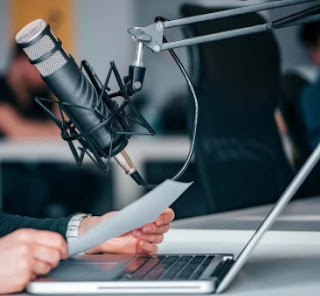Sunday Spotlight: Podcasting!
The rise of podcasting in the early to mid-2000's had an impact on all genres of entertainment, but particularly in science fiction. Many of today's writers built their careers on podcasting, as audible versions of books and short stories became increasingly common.
Adam Curry and Dave Weiner are generally credited as being responsible for the invention of podcasting. What they did exactly is technical, and there are disputes about how exactly it was done, but it involved the creation and coding of RSS feeds. From there, it became a matter of users creating content, and consumers downloading it.
By February of 2004, technologist Ben Hammersley had coined the term "podcast" for the burgeoning media form, since iPods were being used as a primary means of downloading them. New hosting services were soon founded, like Liberated Syndication, which began in October of 2004.
Early sci fi podcasters centered around DragonCon in Atlanta, GA, and Balticon in Baltimore, MD. Both of these were within easy driving distance for a young woman from North Carolina named Mur Lafferty.
It's impossible to talk about sci fi podcasts without discussing Mur Lafferty. She was one of the first to have a sci fi variety show called Geek Fu Action Grip. It started way back in the earliest days of podcasting in December of 2004, and continued on until 2009. It helped establish what sci fi podcasts could really be like, and established Mur within the sci fi community as a primary content maker.
Mur connected with Michael R. Mennenga and Evo Terra, two founding fathers of podcasting, and soon helped them provide content for an early geeky-topic podcast called Wingin' It, which launched on March 31, 2005, and ended sometime around 2009. She networked with Steve Eley, who launched the Escape Pod podcast on May 16th, 2005. Mur Lafferty was there at the start of it all. In fact, it was Lafferty herself who launched an offshoot of Escape Pod, called Pseudo Pod, which focused on horror. A fantasy-themed offshoot called PodCastle soon followed.
By 2006, podcasting was a phenomenon, and new podcasts were cropping up everywhere. Awards were founded and handed out to the best shows. But Mur noticed that the subjects of sci fi and fantasy were being passed over for such awards. She coordinated with Michael Mennenga and fantasy author Tracy Hickman, and together they founded the Parsec Awards in 2006, with awards handed out at DragonCon. It awarded the best speculative fiction podcasts in multiple categories, such as best story, best news, best fan podcast, etc. One of the oldest existing podcasts, Sword & Laser, appeared by 2008. That same year, the young Clarkesworld magazine was the first major short-story publisher to use podcasting. Clarkesworld soon became one of the premier science fiction story magazines in the business, in part because it was reaching an audience the other legacy publishers weren't.
One of the oldest existing podcasts, Sword & Laser, appeared by
2008. That same year, the young Clarkesworld magazine was the first
major short-story publisher to use podcasting. Clarkesworld soon became
one of the premier science fiction story magazines in the business, in
part because it was reaching an audience the other legacy publishers
weren't. Some podcasts focused so exclusively on books that they were books themselves. Podiobooks.com (which was later taken over by Scribl) proved to be a place where young authors could read chapters of their new books into audio format, thus giving their books a new market.
By the twenty-teens, podcasting was almost a necessity. Many a career was been built or boosted through podcasting. For example, Sword & Laser once podcast a series of stories by an unknown author named Hugh Howey, and his book, Wool, went on to tremendous success. Charlie Jane Anders and Annalee Newitz bolstered their careers with their podcast, Our Opinions Are Correct, which won a Hugo in 2019.
Today, there's scarcely a sci fi club out there without a podcast of some sort. It is only a small sliver of the massive podcasting phenomenon, but it has become a staple.
Eric
*




Comments
Post a Comment